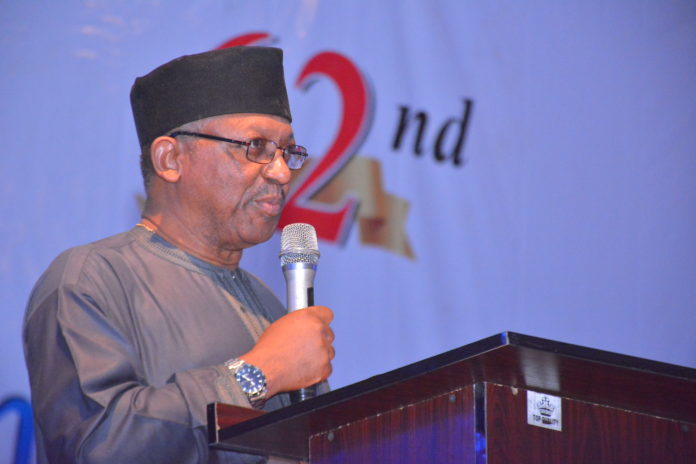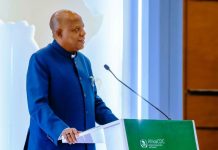The Federal Ministry of Health is to commence provision of technical support to all States of the Federation and the FCT for the adoption and implementation of the National Roadmap for accelerating reduction of Maternal and Neonatal mortality in Nigeria at all levels and the designation of Desk Officers at both the Federal and State levels.
This resolution was part of the 36-point communiqué issued at the end of the 62nd National Council on Health meeting held at Asaba, Delta State from 9th to 13th September, 2019.
The Council meeting presided over by the Hon. Minister of Health, Dr. Osagie Ohanire, also resolved that the Federal, 36 States and the FCT should adopt and commence implementation of the National Quality of Care Strategy for the reduction of Maternal and Neonatal mortality at all levels.
Other resolutions adopted by the Council are as follows:
- Federal Ministry of Health, the 36 states and the FCT and health stakeholders should adopt the National Council on Health (NCH) handbook as a guide on all National/State Council on Health (SCH) matters in Nigeria;
- Federal Ministry of Health should continuously build the capacity of relevant officers at all levels on NCH matters including writing of good quality NCH/SCH memoranda;
- The ten-year compendium on NCH resolutions should be used as a score card for evaluating the impact of NCH meetings;
- All Departments, Agencies and Parastatals of the Federal and State Ministries of Health should develop Annual Operations Plans (AOPs) on or before 3rd quarter each year to inform annual budget development and to demonstrate the operationalisation of the NSHDP II;
- Federal Ministry of Health to continue monitoring the implementation of the NSHDP II at all levels and report progress to Council at every council meeting;
- Federal, 36 States and FCT should ensure Development Partners supporting the implementation of the NSHDP II key into the AOP regime as part of their support;
- Federal, 36 states and FCT should adopt and commence implementation of the National Health Promotion Policy (2019);
- All Development partners and Civil Society Organisations to endorse the Country Compact committing to the implementation of the Second National Strategic Health Development Plan;
- Federal, 36 States and FCT should adopt and commence implementation of the National Noma Policy and three-year Noma action plan for Nigeria (2019 – 2021) and identify more centres for establishment;
- Federal, 36 States and FCT should adopt and commence implementation of the National Policy and Strategic Plan for Ear and Hearing Care (EHC) at all levels;
- State Coordinators for EHC activities should be appointed in all 36 State Ministries of Health and FCT to work with the Desk Officers on EHC at the Federal Ministry of Health;
- The National Health Research Ethics Committee (NHREC) should establish an electronic platform (e-platform) for protocol submission and review;
- The NHREC should commence charging of 0.5% of grant value as fees for submission and review of protocols from researchers;
- Federal, 36 states and FCT should observe World Food Safety Day (WFSD) celebration and activities at all levels;
- All 36 States and FCT should establish Traditional, Complementary and Alternative Medicine Department/Boards to enhance coordination, regulation and control of TCAM practice and its products in Nigeria;
- Federal, 36 states and FCT should ensure appropriation of adequate funds for polio eradication and routine immunization to enable the polio eradication programme sustain its high impact interventions to finally achieve certification and a polio free status;
- 36 states and FCT should establish or reactivate State/LGAs Task Forces on Immunization (STFI/LGTFIs) to provide the needed coordination and oversight at the state and LGA levels as well as for Council to interface with Governors and Chairmen of LGAs with identified low commitment;
- Federal, 36 states and FCT should engage with development partners working in states to develop a transition mechanism by end of 1st quarter 2020 to cushion the effects of the global ramp down of polio resources which inevitably leads to lay off of several development partners agencies’ members of staff, as we move closer to certification;
- Federal, 36 states and FCT should adopt and commence implementation of the National Eye Health Policy at all levels and the designation of Eye Health desk officer to interface with the National Eye Health Programme;
- Federal, 36 states and FCT should adopt and commence implementation of Treatment Guideline for Child Eye Health at all levels of government by all stakeholders in the Nigerian Health Sector;
- All 36 states and FCT should establish State Drug Resistant Tuberculosis (DR-TB) treatment compliance teams;
- Federal, 36 State Ministries of Health and FCT Health and Human Services Secretariat should create Legal Units where none exists and create and institutionalize a MEDICO-LEGAL WEEK to create awareness on legal issues in health;
- Federal Ministry of Health should repurpose the national coordination architecture for health sector response to humanitarian crisis to provide normative guidance for processes geared towards improving health outcomes for populations within fragile settings;
- Federal, 36 States and FCT to improve health outcomes within fragile setting by strengthening and scaling up present response modalities;
- Federal Ministry of Health in collaboration with States and other relevant stakeholders should develop a national policy document for the health of refugees, migrants and internally displaced persons.
- Federal Ministry of Health should set up and operationalize systems to collaborate with the Ministry of Humanitarian Affairs, Disaster Management and Social Development in the provision of relevant technical support for health in humanitarian crisis, and disaster management;
- Federal, 36 State Ministries of Health and FCT Health and Human Services Secretariat to prioritize the provision of Water, Sanitation and Hygiene services in health facilities across the country by creating a budget line or increasing budgetary allocation for Water, Sanitation and Hygiene;
- Federal Ministry of Health should develop a policy that will guarantee free treatment for all Leishmaniasis patients, the inclusion of Leishmaniasis treatment into procurement plan/budget of the Ministry of Health for the purchase of drugs on annual basis and that development partners working in the State support the initiative;
- All State Ministries of Health and Agriculture and Rural Development, Departments and Agencies to create budget lines for training of staff as field epidemiologists in the Nigerian Field Epidemiology and Laboratory Training Programme;
- All tertiary and specialist hospitals in Nigeria should procure and ensure a continuous supply of basic antidotes in their hospitals;
- All tertiary and specialist hospitals should establish functional poison centres in all satellite hospitals or clinics that are affiliated to tertiary hospitals and in all states of the federation to improve access to medical management of poisoning;
- All States and FCT should establish data quality “control rooms” domiciled in their Primary Health Care Boards (PHCBs) for stakeholders to address challenges relating to service delivery on District Health Information System (DHIS2) for the enhancement of decision making through the use of quality data;
- Federal Ministry of Health should disseminate the report of the 2017 National Health Accounts Study as validated by stakeholders from the 36 States and FCT; and
- States and FCT should adopt Workload Indicator of Staffing Needs (WISN) tool for the assessment of Human Resource for Health needs and distribution at all levels of the health sector.
The National Council on Health, as provided for in the National Health Act (2014), is the highest policy making body on matters relating to health in Nigeria. The membership comprises the Honourable Minister of Health who is the Chairman of the Council, the Honourable Minister of State for Health, State Commissioners for Health of the 36 States, and the Secretary of Health & Human Services Secretariat, FCTA.
A total of 821 delegates participated from the Departments, Agencies and Parastatals of the Federal Ministry of Health, State Ministries of Health and the Health & Human Services Secretariat of the Federal Capital Territory Administration, Abuja with the exception of Jigawa State that was absent.
Others in attendance were members of the National Assembly, representatives of Federal Ministries of Education, Water Resources, Communication, Environment as well as , Population Council, Bureau of Public Enterprises, Nigeria Governors Forum, Federal Competition and Consumer Protection Commission, Department of State Services and Medical Corps of the Nigeria Army, Nigeria Navy, Nigeria Police, Federal Road Safety Corps, Nigeria Correctional Service, Nigeria Customs Service and the Nigeria Security & Civil Defence Corps.
There were also delegates from Development Partners, Civil Society Organisations, Private Sector Organisations, Health Professional Associations and Health Professional Regulatory Bodies.
Enefaa Bob-Manuel
Head Media and Public Relations






